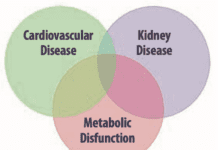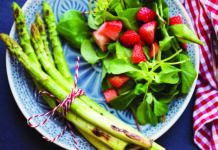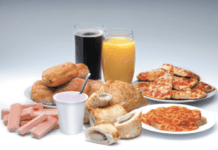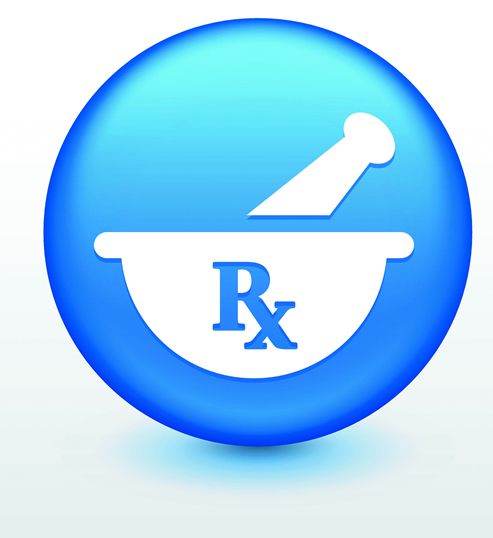Many concerns about interactions between medications and foods are unfounded. Understanding how foods interact with absorption and metabolism of common medications—and how to work around side effects that may influence dietary intake—can help reduce the stress around making healthy dietary choices.
MYTH #1: All medications should be taken with (or without) food. “The effect of taking a drug on a full stomach can be very different than taking it on an empty stomach,” says David J. Greenblatt, MD, a professor at Tufts University School of Medicine and clinical pharmacology researcher. “Food leaves the stomach slowly, so drugs taken on a full stomach will be absorbed more slowly, which can be good or bad. Additionally, for some drugs absorption may be greater with food; for others absorption will be reduced.” While timing often does not matter, recommendations vary by drug, so it is important to check product labels before taking. Your pharmacist or healthcare provider can provide more information.
Food-drug interactions are uncommon, but try these tips to ensure prescription medications are as safe and effective as possible:
- Check medication labels or ask your pharmacist or healthcare provider if it matters whether or not a drug is taken with food
- Limit grapefruit intake to one-half a fruit or one eight-ounce glass a day or less if you take statins to lower cholesterol levels. Avoiding grapefruit entirely is only necessary if you take simvastatin (Zocor)
- Keep vitamin K intake steady if you take the blood thinner warfarin (Coumadin or Jentoven), choose green veggies with a more modest content of vitamin K (such as Brussels’ sprouts or asparagus) and eat a consistent amount daily
- Seek help from a Registered Dietitian Nutritionist or your healthcare provider if medication side effects impact food intake
MYTH #2: People on anti-coagulant medications must avoid vitamin K. Warfarin (Coumadin, Jentoven) helps stop blood clots. Since vitamin K helps blood to clot, it can change the way warfarin works. “People taking warfarin can eat vitamin K-containing foods, but they should choose foods with a more modest content and eat a consistent amount daily,” says Amanda Vest, MBBS, MPH, medical director of the transplantation program at Tufts Medical Center. “This keeps the amount of vitamin K in the body steady, which helps the anti-coagulation effect of warfarin remain stable from day to day.”
The highest levels of vitamin K are found in dark leafy greens such as kale, spinach, collard greens, and broccoli, which may be best to avoid unless they are part of your regular daily intake. Moderate levels are found in Brussels’ sprouts, asparagus, cabbage, beans and a few fruits. “Cutting these foods out of the diet entirely restricts an important source of healthy vitamins, minerals, and fiber that help maintain good overall health,” says Vest.
MYTH #3: People on statins must stay away from grapefruit. “With the exception of simvastatin (Zocor), it is safe to take statin medications with customary amounts of grapefruit products—such as one glass of typical commercially-available grapefruit juice, or one-half of a whole grapefruit,” says Greenblatt. “Some of the research studies involving grapefruit juice and statins used unrealistically large quantities or ‘super-strength’ forms of juice. You may see printed warnings and precautions based on these kinds of studies, but the warnings do not apply to typical or customary amounts of grapefruit of grapefruit juice.”
Myth #4: Medication side effects just have to be accepted. A number of medication side effects can get in the way of food intake: Dry mouth, taste changes, loss of (or increase in) appetite, and even constipation can make healthy dietary intake challenging. If you are dealing with any of these side effects, talk to your health care provider about other medication options or referral to a Registered Dietitian Nutritionist. There are many tips and tricks for managing these side effects. For example, for dry mouth, choosing soft, moist proteins like eggs and fish; adding gravies and sauces; cooking soups and stews; and eating canned fruits (preferably in natural juices) instead of raw can make healthy eating easier.
Likewise, if it has been recommended you change your diet as a result of a diagnoses like high blood pressure, diabetes, or gout, talk to a nutrition professional or find reputable websites (such as the American Heart Association, American Diabetes Association, or National Institutes of Health) to guide you. Restricting one’s diet unnecessarily may lead to detrimental effects.
























